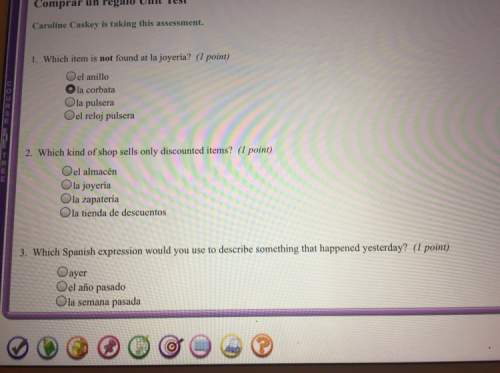
Spanish, 24.12.2019 01:31 michael1295
Food and drinks• food (comidas) and drinks (bebidas) can be grouped in different ways. study the following. fruitslas manzanas(apples)las bananas(bananas)las uvas(grapes)grainsel cereal(cereal)el pan(bread)dairyel yogur(yogurt)los huevos(eggs)meatsla hamburguesa(hamburger)el sándwich de jamón y queso(ham and cheese sandwich)liquidsel café(coffee)la sopa(soup)la leche(milk)el jugo de naranja(orange juice)• read the following dialogue to learn some ways to talk about food.— cuando tengo hambre(i’m hungry), como cereal. — cuando tengo sed(i’m thirsty), bebo jugo. — son las ocho de la mañana. ¿por qué no comes ahora( sí, tengo ganas de(i feel like) comer.— es importante(it’s important) comer un desayuno nutritivo(a nutritious breakfast). — me gusta comer cereal. ¡es muy rico(delicious)! en la cafetería venden(they sell) cereal.— ¿y los huevos? — no me gusta comer huevos. ¡son horribles(horrible)! para el desayuno, como cereal. para el almuerzo(lunch), como cereal. para la cena(dinner), ¡también como cereal! — ¿qué? (what? ) es importante comer otras (other) comidas. level 1 pp. 140–141level 1a pp. 156–158did you get it? presentación de vocabulario unidad 3 lección 1reteaching and practice answers

Answers: 2


Another question on Spanish

Spanish, 22.06.2019 11:20
1) todos los veranos yo (1) iba (ir) a casa de mis tíos en guayaquil. mi primo jaime y yo (2) (hacer) muchas actividades juntos. durante el día (3) (ir) de compras a la ciudad. generalmente, yo no (4) (comprar) nada, pero un día en el centro comercial, mi primo (5) (ver) una chaqueta que a mí me gustó mucho. nosotros (6) (entrar) en la tienda. la dependienta nos (7) (decir) que la chaqueta (8) (costar) cincuenta dólares. yo (9) (probarse) la chaqueta y enseguida (10) (pagar) con tarjeta de crédito.
Answers: 3

Spanish, 23.06.2019 08:20
When could you attach the direct object pronoun to an infinitive verb? a: when an infinitive verb follows a conjugated verb. b: when an infinitive verb ends in a question. c: when a stem-changing verb ends in a question. d: when a stem-changing verb follows a conjugated verb.
Answers: 2

Spanish, 24.06.2019 21:00
Decide whether the sentence is grammatically correct or incorrect as written. hay muchos estudiantes en la escuela.
Answers: 2

You know the right answer?
Food and drinks• food (comidas) and drinks (bebidas) can be grouped in different ways. study the fol...
Questions

Mathematics, 06.10.2019 00:00



History, 06.10.2019 00:00

English, 06.10.2019 00:00

Social Studies, 06.10.2019 00:00



English, 06.10.2019 00:00

Chemistry, 06.10.2019 00:00



History, 06.10.2019 00:00

Health, 06.10.2019 00:00


Social Studies, 06.10.2019 00:00


Mathematics, 06.10.2019 00:00


Mathematics, 06.10.2019 00:00




